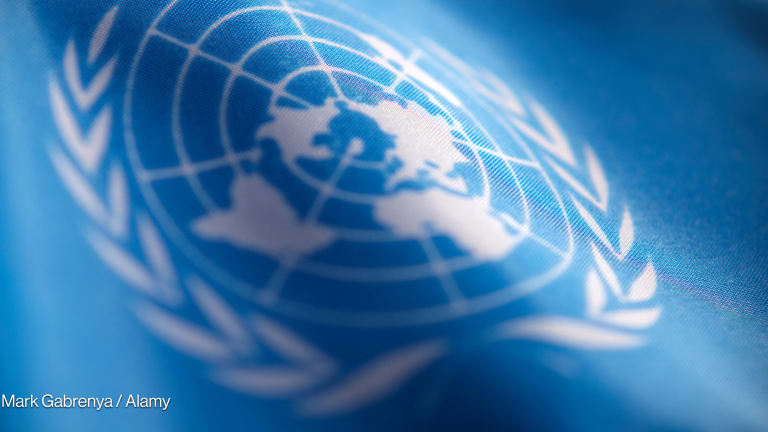Humanitarian funding gap hits new record
A total of $46.3 billion is now needed to tackle the world’s crises, according to a recent United Nations report.
The level of humanitarian aid that is needed to tackle the world’s crises has risen to a new high of $46.3 billion, according to a report released last month by the United Nations Office for the Coordination of Humanitarian Affairs. The report said that 306 million people now need humanitarian support — up by 20% from last year, according to Devex calculations — while the amount of needed funding has risen by 29% from mid-2021. But appeals are also at their most underfunded level for the halfway point in the year. “The gap between the financial requirements and the resources to meet them currently stands at $36.9 billion – the highest ever,” the report said, calling the shortfall “a deep cause of concern, particularly in light of persistent conflict, widespread consecutive drought, and the multiple and wide-ranging secondary impacts of the crisis in Ukraine.” There are currently 41 U.N. appeals, including 28 humanitarian response plans to address long-standing crises in different countries, as well as five “flash appeals” to respond to emerging crises, such as the one surrounding the Russian invasion of Ukraine. There are also seven regional response plans for crises that have spread beyond a single country, and a joint response plan for the Rohingya humanitarian crisis, implemented in partnership with the government of Bangladesh. The total funding needed to address these crises has risen by more than $5 billion since the end of last year, almost entirely due to the impact of the Ukraine crisis, OCHA said. In total, $9.5 billion has been donated to U.N. plans, and around $5.5 billion has been donated outside of the plans to address the same crises, bringing the sum of funding to $15 billion so far this year. This is more than the amount donated at this same point last year but not enough to address the level of need. The increase in funding corresponds closely to the roughly $2 billion recorded to address the crisis in Ukraine, which rose from almost nothing in the previous year. Funding to Afghanistan has risen by about $1.1 billion compared with last year. Funding to many other crises has fallen compared with the same point last year, despite rising need. Underfunded crises Since the report’s publication in late June, OCHA has published updated figures related to humanitarian funding on its Financial Tracking Service, although the overall position remains similar to that outlined in the report. FTS data shows that the three largest humanitarian response plans are also the most underfunded in dollar terms. Syria requires $4.4 billion, but its funding sits at just $1 billion — only 23% of what is required. Afghanistan also requires $4.4 billion but has received only $1.5 billion, or 34% of what is required. Meanwhile, Yemen requires $4.3 billion but has received $1.1 billion — 26% of what is required. OCHA said in its report that Yemen has also seen the largest fall of all funding relative to the same position last year, with $580 million less. In percentage terms, one of the most underfunded humanitarian response plans is the recently established fund for Ethiopia, which requires $2.75 billion but has received no funding so far. Another is the plan for Burundi, which is estimated to need $182 million but has received only a little under $8 million, or just 4% of what is needed. A regional response plan to deal with the impacts of the Syrian crisis needs $5.6 billion in funding, OCHA estimates. But it has received just $616 million, or 11% of what is needed. In contrast, one of the most funded appeals, both in absolute and percentage terms, is the Ukraine flash appeal, which is ahead of target for this point in the year. The appeal has received nearly $1.75 billion of the $2.25 billion needed — 78% of the total required funding.
The level of humanitarian aid that is needed to tackle the world’s crises has risen to a new high of $46.3 billion, according to a report released last month by the United Nations Office for the Coordination of Humanitarian Affairs.
The report said that 306 million people now need humanitarian support — up by 20% from last year, according to Devex calculations — while the amount of needed funding has risen by 29% from mid-2021.
But appeals are also at their most underfunded level for the halfway point in the year.
This story is forDevex Promembers
Unlock this story now with a 15-day free trial of Devex Pro.
With a Devex Pro subscription you'll get access to deeper analysis and exclusive insights from our reporters and analysts.
Start my free trialRequest a group subscription Printing articles to share with others is a breach of our terms and conditions and copyright policy. Please use the sharing options on the left side of the article. Devex Pro members may share up to 10 articles per month using the Pro share tool ( ).
David Ainsworth is business editor at Devex, where he writes about finance and funding issues for development institutions. He was previously a senior writer and editor for magazines specializing in nonprofits in the U.K. and worked as a policy and communications specialist in the nonprofit sector for a number of years. His team specializes in understanding reports and data and what it teaches us about how development functions.








